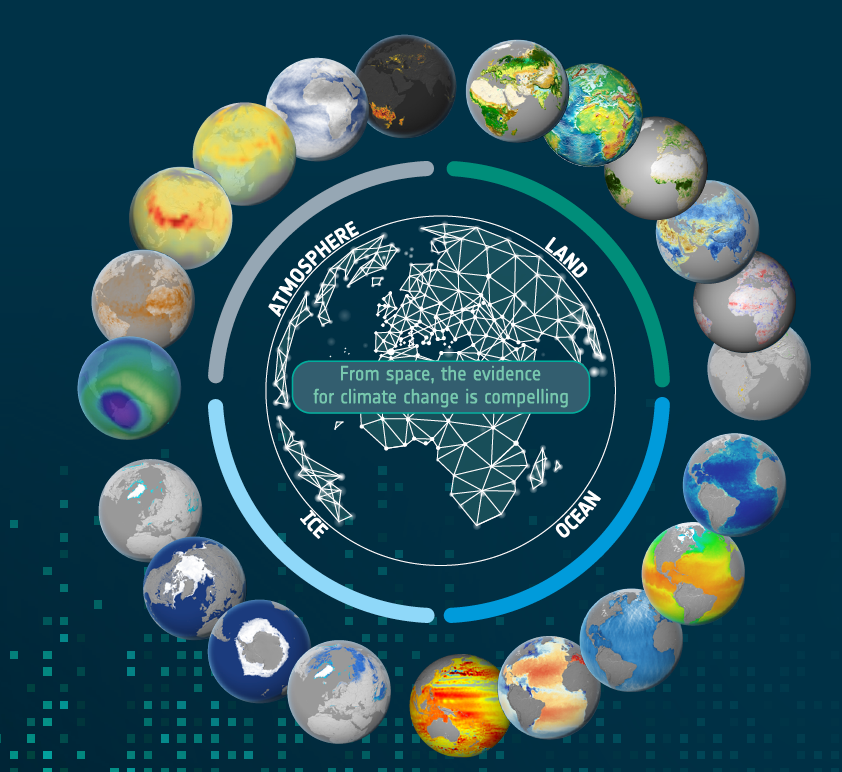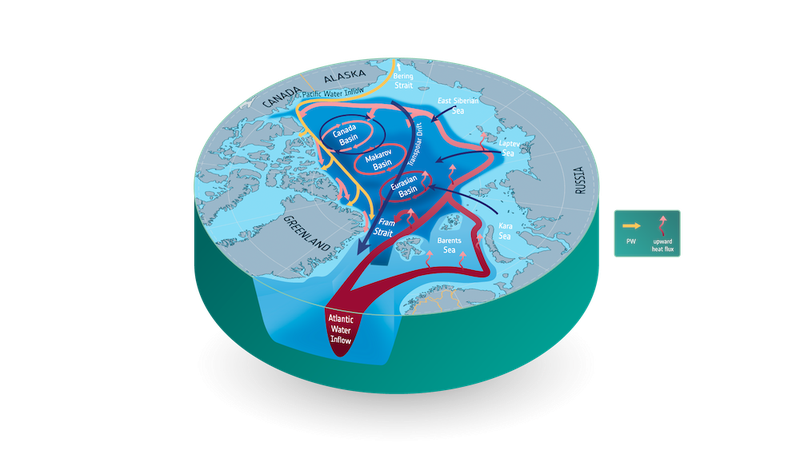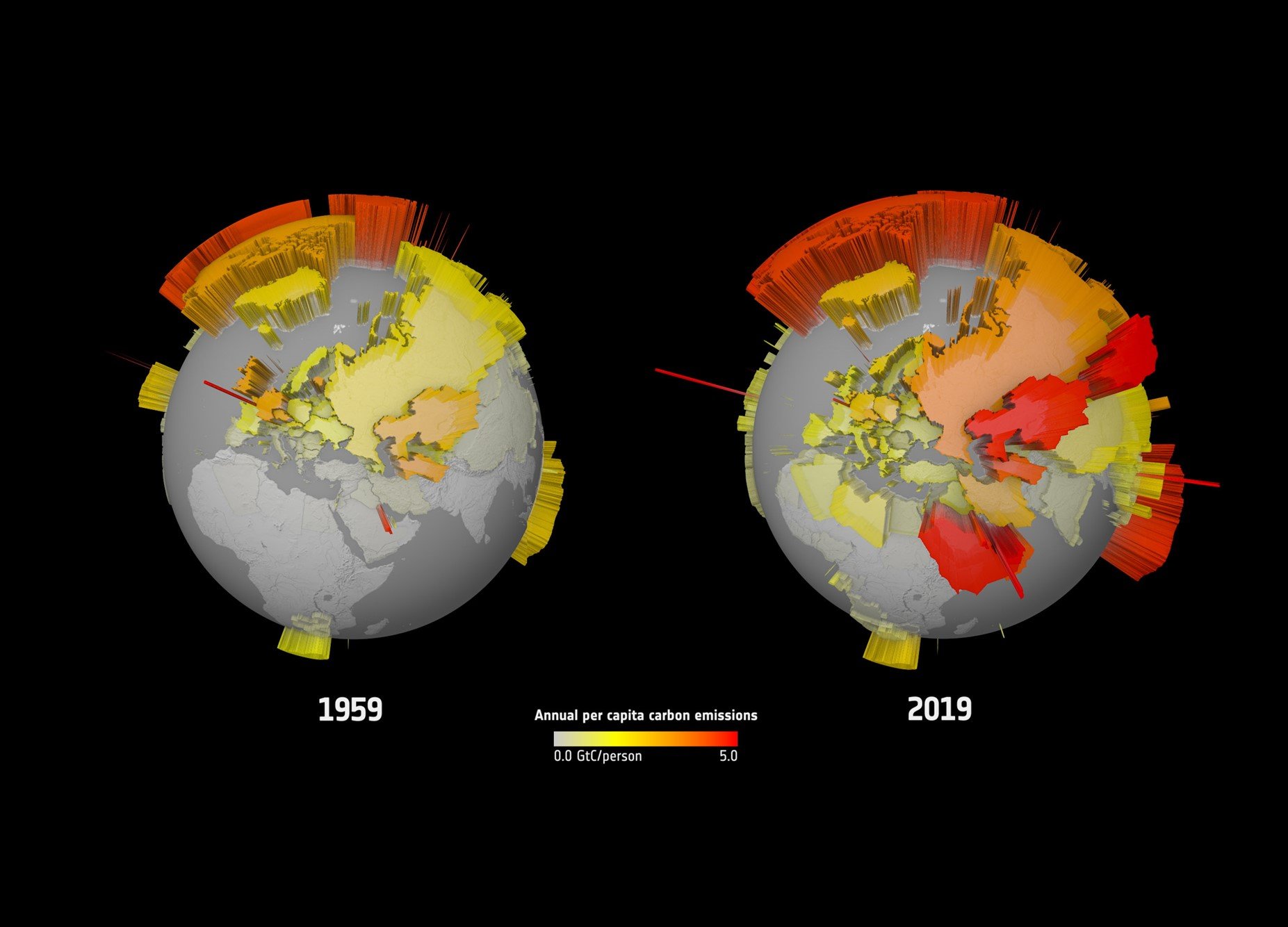This decade is crucial for determining whether the global community will succeed in tackling climate challenges. Taking decisive action, informed by state-of-the-art science is key to limiting the global average temperature rise to as close to 1.5°C as possible, as defined in the Paris Agreement. Achieving this goal demands effective decision-making driven by the latest science. It is here where Earth observation satellites provide the global evidence that is equipping the research community and policymakers to navigate the path to a sustainable future.
17 years of delivering critical Earth observation data
The international demand for systematic observations to advance climate science led to the European Space Agency establishing the Climate Change Initiative (CCI) in 2008. Since then, this major research and development effort has developed an expanding range of long-term satellite data records – and associated retrieval algorithms – each addressing key aspects of the climate, known as Essential Climate Variables (ECVs). With over 500 scientific experts from across Europe contributing, CCI data records are critical for climate services and modelling, providing the physical evidence base that underpins major assessments such as Intergovernmental Panel on Climate Change (IPCC) reports. The initiative is evolving in response to the increasing needs of climate science, policy and action.
Since 2023, the CCI has entered a new phase, shifting its focus from individual ECV development to the integrated exploitation of combining ECV data. This transformation aims to address key climate challenges and data gaps, strengthen the link between satellite observations and climate models, and support the development of advanced climate services. With an increasing focus on supporting national and collective action, the CCI now plays a pivotal role in supporting progress towards the Paris Agreement. Its vision is to enable evidence-based decision-making at all levels, thereby reinforcing Europe’s contribution to global climate efforts.
“Consulting with services such as Copernicus helped us to understand their data requirements. Thanks to space-based observation records, we have insights that would have been impossible 10 years ago. This collaboration enables on-going improvement for data users, as feedback and new requirements steer our research focus” says Dr Susanne Mecklenburg, Head of Division for Climate and Long-Term Action at the European Space Agency.
Until the second Global Stocktake in 2029 the programme will expand and extend the existing portfolio of Essential Climate Variables by exploiting ESA's new satellite missions to address evolving user requirements.

Connecting the dots: Closing knowledge gaps in climate science
Climate research depends on consistent and accessible data tailored for scientific analysis. Around two-thirds of the total 56 ECVs used to characterise Earth’s climate are derived either entirely, or in large part from space. ESA's CCI is spearheading efforts, with an expanding suite of 28 ECV satellite data records under development – some of which chart the climates evolution over the past five decades. The science-ready datasets support research priorities established by the IPCC, the Global Climate Observing System and the World Climate Research Programme.
By combining Climate Change Initiative datasets, state-of-the-art research is accelerating knowledge of Earth’s energy, water and carbon cycles. Contributing to the CCI main objectives, several of these cross-ECV research and development projects are commissioned and currently studying combinations of these key parameters worldwide. This approach enables researchers to investigate knowledge gaps, deepen insight into Earth system processes, and shedding new light on complex science challenges including understanding Aerosol-Cloud Interactions’ role in climate cooling, and studying the Earth Energy Imbalance to quantify processes driving energy cycle shifts due to human activities.
Combined use of CCI datasets demonstrates the power of integrated analysis: for example, a cross-ECV project that seeks to deepen our understanding of Arctic freshwater processes by combining Earth observation data records of seven ECVs, like river discharge, snow, and glaciers. Using rigorous uncertainty analysis across all datasets, the project delivers an enhanced Earth observation database for the Arctic, enabling climate modellers and researchers to advance Arctic Ocean research.

This cross-ECV approach is also being used to develop techniques to study and identify tipping elements, which have the potential to shift Earth’s climate irreversibly into a new, and potentially less favourable state.
"Equipped with data on individual ECVs, modellers were well positioned. The next step was to explore how these datasets could be meaningfully combined to address critical climate research challenges. We therefore initiated cross-ECV activities to harness the potential for advancing our understanding of Earth system interactions" says Dr Susanne Mecklenburg.
Supporting the Paris Agreement through evidence-based action
By coordinating climate research through the CCI, the European Space Agency's climate work harnesses Earth observation data and methods to support the implementation of the Paris Agreement. Examples include using Earth observation records to better estimate emissions from sources and sinks – key for calculating the global carbon budget, improving national emissions reporting, and evaluating collective progress via the Global Stocktake. One of the CCI projects develops a global framework combining satellite data and data-driven modelling approaches to estimate greenhouse gas fluxes for critical regions and compare them with national greenhouse gas inventories, and in turn providing a valuable consistency check on a progress towards meeting country level Paris Agreement commitments. It also aims to reduce the imbalance between sources and sinks in the global carbon budget by targeting regions where uncertainties are particularly high.

The CCI provides and exploits the data to support informed decisions and climate action of national governments and policymakers These efforts reduce uncertainties, enhance transparency, and empower countries to meet their reporting obligations. As limiting the impact of global warming will increasingly require adaptation alongside emission cuts, satellite data will continue to support this critical transformation, especially in areas like city development, human health and biodiversity to support the goals of the Paris Agreement.
Improving climate modelling with satellite data
Trustworthy climate predictions depend on accurate models, which are validated by empirical observations. The European Space Agency provides observation-based benchmarks in the form of datasets that help to calibrate and improve climate models, thereby reducing uncertainty in projections. Climate modellers and operational climate services use Climate Change Initiative research and data to anticipate future change, inform long-term strategies and support national, civic and the private sector decision-making. They also use the datasets to verify their models and characterise the individual physical processes more accurately.
CCI engages with the modelling community to ensure that Earth observation data continues to refine the models used by governments, industry and the research community to inform climate response strategies. The Climate Change Initiative plays a vital role in bringing together the observational and modelling communities through its Climate Modelling User Group, as well as by collaborating with the Coupled Model Intercomparison Project, which the European Space Agency hosts on behalf of the World Climate Research Programme.
Find out more about the 28 Essential Climate Variables and the datasets in the Open Data Portal.

